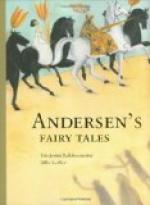Never before, he thought, had he been in such a coarse and ignorant company; one might almost fancy the people had turned heathens again. “It is the most dreadful moment of my life: the whole world is leagued against me!” But suddenly it occurred to him that he might stoop down under the table, and then creep unobserved out of the door. He did so; but just as he was going, the others remarked what he was about; they laid hold of him by the legs; and now, happily for him, off fell his fatal shoes—and with them the charm was at an end.
The Councillor saw quite distinctly before him a lantern burning, and behind this a large handsome house. All seemed to him in proper order as usual; it was East Street, splendid and elegant as we now see it. He lay with his feet towards a doorway, and exactly opposite sat the watchman asleep.
“Gracious Heaven!” said he. “Have I lain here in the street and dreamed? Yes; ’tis East Street! How splendid and light it is! But really it is terrible what an effect that one glass of punch must have had on me!”
Two minutes later, he was sitting in a hackney-coach and driving to Frederickshafen. He thought of the distress and agony he had endured, and praised from the very bottom of his heart the happy reality—our own time—which, with all its deficiencies, is yet much better than that in which, so much against his inclination, he had lately been.
III. The Watchman’s Adventure
“Why, there is a pair of galoshes, as sure as I’m alive!” said the watchman, awaking from a gentle slumber. “They belong no doubt to the lieutenant who lives over the way. They lie close to the door.”
The worthy man was inclined to ring and deliver them at the house, for there was still a light in the window; but he did not like disturbing the other people in their beds, and so very considerately he left the matter alone.
“Such a pair of shoes must be very warm and comfortable,” said he; “the leather is so soft and supple.” They fitted his feet as though they had been made for him. “’Tis a curious world we live in,” continued he, soliloquizing. “There is the lieutenant, now, who might go quietly to bed if he chose, where no doubt he could stretch himself at his ease; but does he do it? No; he saunters up and down his room, because, probably, he has enjoyed too many of the good things of this world at his dinner. That’s a happy fellow! He has neither an infirm mother, nor a whole troop of everlastingly hungry children to torment him. Every evening he goes to a party, where his nice supper costs him nothing: would to Heaven I could but change with him! How happy should I be!”
While expressing his wish, the charm of the shoes, which he had put on, began to work; the watchman entered into the being and nature of the lieutenant. He stood in the handsomely furnished apartment, and held between his fingers a small sheet of rose-colored paper, on which some verses were written—written indeed by the officer himself; for who has not, at least once in his life, had a lyrical moment? And if one then marks down one’s thoughts, poetry is produced. But here was written:




